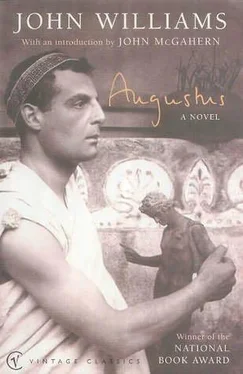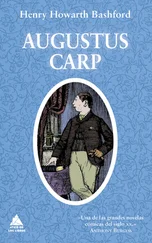John Williams - Augustus
Здесь есть возможность читать онлайн «John Williams - Augustus» весь текст электронной книги совершенно бесплатно (целиком полную версию без сокращений). В некоторых случаях можно слушать аудио, скачать через торрент в формате fb2 и присутствует краткое содержание. Жанр: Историческая проза, на английском языке. Описание произведения, (предисловие) а так же отзывы посетителей доступны на портале библиотеки ЛибКат.
- Название:Augustus
- Автор:
- Жанр:
- Год:неизвестен
- ISBN:нет данных
- Рейтинг книги:3 / 5. Голосов: 1
-
Избранное:Добавить в избранное
- Отзывы:
-
Ваша оценка:
- 60
- 1
- 2
- 3
- 4
- 5
Augustus: краткое содержание, описание и аннотация
Предлагаем к чтению аннотацию, описание, краткое содержание или предисловие (зависит от того, что написал сам автор книги «Augustus»). Если вы не нашли необходимую информацию о книге — напишите в комментариях, мы постараемся отыскать её.
Augustus — читать онлайн бесплатно полную книгу (весь текст) целиком
Ниже представлен текст книги, разбитый по страницам. Система сохранения места последней прочитанной страницы, позволяет с удобством читать онлайн бесплатно книгу «Augustus», без необходимости каждый раз заново искать на чём Вы остановились. Поставьте закладку, и сможете в любой момент перейти на страницу, на которой закончили чтение.
Интервал:
Закладка:
My father had dreamed that Marcellus, his sister's son, would succeed him; thus, he betrothed me to him. Marcellus died. And then he dreamed that Agrippa would succeed him, or at least would bring one of my sons (whom my father had adopted) to a point of sufficient maturity to adequately carry on his duties. Agrippa died, and my sons were still children. No male of the Octavian line remained, and there was no one else whom he could trust or over whom he had sufficient power. There was only Tiberius, whom he detested, though he was his stepson.
Shorriy after the death of Marcus Agrippa, the inevitability of what I had to do began to work inside me like an infected wound whose existence I would not admit. Li via smiled at me complacently, as if we shared a secret. And it was not until I was near the end of my year of mourning that my father summoned me to tell me what I already knew.
He met me himself at the door, and dismissed the servants who had accompanied me. I remember the quietness of the house; it was late in the afternoon, but no one seemed about, except my father.
He led me across the courtyard to the little cubicle off his bedroom that he used as an office. It was very sparsely furnished, with a table and a stool and a single couch. We sat and talked for a while. He asked about the health of my sons, and complained that I did not bring them to visit him often enough. We talked of Marcus Agrippa; he asked me if I still grieved for him. I did not answer. There was a silence. I asked:
"It is to be Tiberius, isn't it?"
He looked at me. He breathed deeply, and let his breath out, and looked at the floor. He nodded.
"It is to be Tiberius."
I knew it was to be, and-had known; yet a shock like fear went through me. I said:
"I have obeyed you in all things since I can remember. It has been my duty. But in this I find myself near to disobedience."
My father was silent. I said:
"You once made me compare Marcus Agrippa to some of my friends of whom you disapproved. I joked, but I did compare; and you must know the outcome of that comparison. I ask you now to compare Tiberius to my late husband, and ask yourself how I might endure such a marriage."
He lifted his hands, as if to fend off a blow; still he did not speak. I said:
"My life has been at the service of your policy, of our family, and of Rome. I do not know what I might have become. Perhaps I might have become nothing. Perhaps I might-" I did not know what to say. "Must I go on? Will you not give me rest? Must I give my life?"
"Yes," my father said. He still did not look at me. "You must."
"Then it is to be Tiberius."
"It is to be Tiberius."
"You know his cruelty," I said.
"I know," my father said. "But I know too that you are my daughter, and that Tiberius would not dare to harm you. You will find a life beyond your marriage. In time, you will grow used to it. We all grow used to our lives."
"There is no other way?"
My father rose from the stool upon which he had been seated and paced restlessly across the floor. I noticed that his limp had grown more pronounced.
"If there was another way," he said at last, "I would take it. There have been three plots against my life since the death of Marcus Agrippa. They were foolishly conceived and ill managed, and therefore easy to discover and deal with. I have been able to keep them secret. But there will be others." His clenched fist struck his open palm softly, three times. "There will be others. The old ones will not forget that an upstart rules them. They will forgive neither his name nor his power. And Tiberius-"
"Tiberius is a Claudian," I said.
"Yes. Your marriage will not guarantee the safety of my authority, but it will help it. The nobility will be a little less dangerous if they believe that one of their own, one who has the Claudian blood, might succeed me. At least it will give them the possibility of patience."
"Will they believe that you would make Tiberius your successor?"
"No," my father said in a low voice. "But they would believe that I might make a Claudian grandson my successor."
Until that moment, although I had accepted the idea of the marriage as inevitable, I had not accepted its actuality.
I said: "So I am once again to be the brood sow for the pleasure of Rome."
"If it were only myself," my father said. He turned his back to me. I could not see his face. "If it were only myself, I would not ask this of you. I would not allow you to marry such a man. But it is not only myself. You have known that from the beginning."
"Yes," I said. "I have known that."
My father spoke as if he were talking to himself. "You have your children by a good man. That will comfort you. You will remember your husband through the children that you have."
We talked longer that afternoon, but I cannot remember what was said. I believe that a numbness must have come over me, for I remember feeling nothing after the first rush of bitterness. Yet I did not dislike my father for doing what he had to do; I should no doubt have done the same thing, had I been in his position.
Nevertheless, when the time came for me to leave, I asked my father a question. I did not ask it angrily, or in bitterness, or even in what might have seemed pity for myself.
"Father," I asked, "has it been worth it? Your authority, this Rome that you have saved, this Rome that you have built? Has it been worth all that you have had to do?"
My father looked at me for a long time, and then he looked away. "I must believe that it has," he said. "We both must believe that it has."
I was in my twenty-eighth year when I was married to Tiberius Claudius Nero. Within the year I had performed my duty, and delivered a child that bore the Claudian and Julian blood. It was a duty that both Tiberius and I found difficult to fulfill; and even that difficulty, it turned out, was in vain. For the child, a boy, died within a week after its birth. Thereafter, Tiberius and I lived apart; he was abroad much of the time, and I discovered again a way of life in Rome.
II. Letter: Publius Ovidius Naso to Sextus Prop er tins (10 B. c.)
Why do I write you the news of this place to which, you have made clear, you intend never to return? In which, you assure me, you no longer have the slightest interest? Is it that I distrust your resolve? Or do I hope merely (and in vain, no doubt) to shake it? In the five or six years that you have absented yourself from our city, you have written exactly nothing; and though you profess to be content with the rural charms of Assisi, and with your books, I cannot easily believe that you have forsaken the Muse whom once you served so well. She waits for you in Rome, I am sure; and I hope that you will return to her.
It has been a quiet season. A lovely lady (whose name you know, but which I shall not mention) has been absent from our circles for more than a year now, which absence has diminished our joy and our humanity. Widowed young, she was persuaded to remarry; and we all know that her new marriage has caused her great unhappiness. Though an important man, her husband is the dourest and least affable man you can imagine; he has no taste for happiness, and cannot endure it in another. He is relatively young-perhaps thirty-two or three-yet except for his appearance, one might take him for a graybeard, he is so irascible and disapproving. He is, I suppose, the kind of man that was common in Rome some fifty or sixty years ago; and he is admired by many of the "older families" simply because ofthat. No doubt he is a man of principle; yet I have observed that strong principle, coupled with a sour disposition, can be a cruel and inhuman virtue. For with that one can justify nearly anything to which the disposition leads him.
But we hope for the future. The lady of whom I have spoken, recently gave birth to a son who died within the week of his birth; the husband, it is understood, will absent himself from Rome on some business on the northern frontiers; and perhaps once again we shall have in our midst her whose wit, gaiety, and humanity may lead Rome out of the dull hypocrisy of its past.
Читать дальшеИнтервал:
Закладка:
Похожие книги на «Augustus»
Представляем Вашему вниманию похожие книги на «Augustus» списком для выбора. Мы отобрали схожую по названию и смыслу литературу в надежде предоставить читателям больше вариантов отыскать новые, интересные, ещё непрочитанные произведения.
Обсуждение, отзывы о книге «Augustus» и просто собственные мнения читателей. Оставьте ваши комментарии, напишите, что Вы думаете о произведении, его смысле или главных героях. Укажите что конкретно понравилось, а что нет, и почему Вы так считаете.











